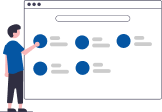Here to Help Your Every Business Need
Work with us today and discover what a difference it makes when you partner with us for your needs.


Our Clientele
Professional Language translation services providers agency in Singapore - Lingua Technologies International has been helping businesses and organizations communicate effectively with their audiences for over two decades as a trusted website translation company in Singapore. We are a global provider of multilingual professional translation services capable of scaling our services both up and down to meet the linguistic, localization and desktop publishing requirements of corporate, non-profit and government clients both large and small. As one of the pioneer translation service companies in Singapore, the company has a global network of more than 5,000 highly qualified in-country translation resources.
Translation & Localization
Certified Translation
Editing & Proofreading

Translation Memory Management
Interpreting
Interpretation Equipment Rental
Desktop Publishing

Transcription
Live Captioning
Subtitling

Others
With nations asserting their identities ever more so than before, the irony of globalization is that it has led to a greater need for localization. To compete effectively in the global market, businesses must adapt the way they communicate with the world. Working with a translation agency in Singapore that is invested in your growth will guarantee your global success. By providing top-notch multilingual language, website translation services, we help transform websites, marketing collaterals, digital marketing content and more into powerful platforms that deliver unmatched user experiences – marketing communications that truly resonate with local customers everywhere.

With a global network of more than 5000 experienced linguists and translators at our disposal, we have been providing high-quality translation services in Singapore since 1996. Serving a wide range of clients from different industries, we have helped them grow their businesses and expand their markets as their go-to professional translation agency.
Our main goal is to ensure that our customers' needs are met, whether related to their business or personal lives. As a reliable translation company in Singapore, we place great importance on confidentiality and use the best technology available to protect your privacy and keep your information safe and secure.
Over the past 17 years, technology has come a long way and we have embraced every one of these changes while our clients delight in the efficiency and speed with which we bring their projects to life.


The only way to optimize customer conversion is to maximize their comfort level with the products and services. To do that, selling to them in a language they are most comfortable with will encourage purchase and buy-in rates. When you engage your global customer in their language, you will be able to reap the following:
From marketing materials to packaging, from user guide to after-sales support, when you translate your marketing communications and product information, you will create a better user experience for your global customers with our tried and tested translation services in Singapore.
Our multilingual translation services in Singapore immediately open up your digital marketing channels to millions of people, and potential customers, who otherwise could not understand it. This means you can now reach clients worldwide through your multilingual website, social media channels, paid online advertisement, etc., simply by tapping on the resources of one of the most experienced translation companies in Singapore.
Tailored, understandable content is the first powerful step towards building profitable customer connections. When you are trying to sell, you must always be using the language spoken by your clients. You are engaging your potential client directly by providing local content in local languages. You can immediately draw them closer to your brand when you choose only to work with a professional translation company today.
Combined Power of Cutting-edge Technology & Native Speakers
We are proud to provide one of the best translations in Singapore, and we credit our success to our combined power of human intelligence and technological advances.
We have a community of experienced and carefully curated translators, who each ensure fast turnaround time and that the copies read well. More than just language translators, they are experts in language style, linguistic connotations, and cultural appropriateness. This is why, as a trusted language translation agency in Singapore, we ensure that our translators are native speakers selected by their superior language proficiency, subject knowledge, and experience.
We keep ourselves updated with the latest translation technology and incorporate the use of these tools in our translation process to help create translation memories that can be leveraged for future use. For example, we update our translation database with the latest terminologies recommended on SG Translate Together to ensure that only terms suitable for the Singapore market are used in translation for Singapore markets..
Deployed strategically in our translation process, and together with our translators, these state-of-the-art tools can help maintain consistency in large-scale translation projects, improve overall translation quality, minimize critical errors, reduce time to market, and in the long run, it can even help manage and rationalize your overall translation costs.
The success of our localization projects is attributed to a winning combination of the following:
FAQs
1. Why Should You Choose Lingua Technologies International As Your Language Translation Providers?
We are dedicated to helping you succeed in your business. Our staff comprises professionals and experts in the field with years of experience and a deep understanding of what it takes to work with clients. We offer the following services:
2. Is Lingua Technologies International THE Reliable Translation Agency In Singapore?
We are a language translation agency that has been in business for more than 20 years. We have a wealth of experience working with clients from all over the world, and our team comprises experts who know what it takes to make your translation a success.
We have an extensive list of languages we can provide translations for to help you grow your business globally. Whether you need translations from English or into English, we have the translation resources to do it!
3. Does Lingua Technologies International Provide Trustworthy and Accurate Results?
We provide accurate language translation services at an affordable price. Our rates are reasonable and considered value-for-money for the high-quality translation output and specialized project management service. It is certainly a well-worth investment and affordable for most businesses without feeling like they are sacrificing quality.
Our service is backed by a globally recognized ISO 17100 certification - an ISO certification created to control translation processes to achieve a high-quality translation output! Our established feedback channel addresses any translation issues that may arise during the translation process to help eliminate any potentially critical issues to help you reach out to your global audiences effectively.
Our team of professional translators is dedicated to helping you get your message across in a way your target audience can understand and connect with. We provide multilingual translation services for all types of content, including:
4. Why Should You Choose Lingua Technologies International As Your Professional Translation Agency?
Back by more than 5000 highly qualified in-country native professional translation experts who can translate any document of any nature into and from multiple languages, we are THE translation company in Singapore trusted by businesses in the United States, Europe, and Asia with their international communication strategies.
For your convenience, we also offer different modes of payment options like PayPal, credit card or bank transfers. Working with Lingua Technologies International as your trusted language translation provider will give you the peace of mind and convenience you have always wanted in a translation company because we do it right.
5. Why Should You Contact Lingua Technologies International; The Top-Ranked Translation Company In Singapore?
We know you are busy, and we want to help you achieve your multilingual communication objectives as efficiently and effectively as possible. Therefore, focusing on doing things right the first time will ensure minimal time wasted on unnecessary mistakes and errors.
When it comes down to it, we welcome jobs that are a little more complicated than usual, and we take it as a challenge for our team because we love helping people communicate in ways that may be out-of-the-box!
6. What Does Lingua Technologies International Value, And How Do We Provide Our Translation Services?
At Lingua Technologies International, we value translation quality, accuracy, and on-time delivery.
Our translators are all native speakers of the language based in their home countries. They are professional translators and subject matter experts who can translate into and from their language of specialization. Every piece of translation content must be 100% true and faithful to its original meaning.
We also ensure your translation delivery is on time and of high quality. Our clients have come to expect this from us, which is why we have built our reputation on delivering high-quality translations quickly and reliably since 1996.years in business
million words translated
clients and counting
Work with us today and discover what a difference it makes when you partner with us for your needs.